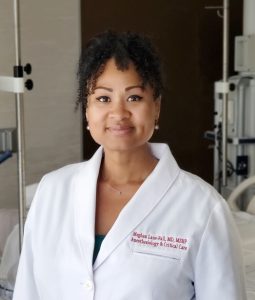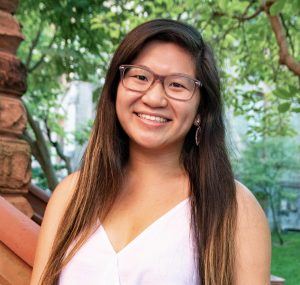In honor of National First Gen Day on November 8th, 2020, Career Services is highlighting experiences, perspectives and advice from first gen professionals in various career fields.
Register HERE to receive a link to our pre-recorded conversation with Dr. Meghan Lane-Fall from Perelman School of Medicine interviewed by Jenny Nguyen ’21.
*Due to the election, this conversation has been pre-recorded. Those registered will receive a link for viewing.
 |
 |
| Guest: Meghan Lane-Fall, MD, MSHP, FCCM | Moderator: Jenny Nguyen is a current senior, pursuing the pre-health track and a Bachelor of Science degree in Bioengineering. |
Learn more about our first-generation professional, Dr. Meghan Lane-Fall.
Meghan Lane-Fall, MD, MSHP, FCCM is Vice Chair of Inclusion, Diversity, and Equity and David E. Longnecker Associate Professor of Anesthesiology and Critical Care at the University of Pennsylvania Perelman School of Medicine, where she also has a secondary appointment in Epidemiology. Dr. Lane-Fall is the first physician and first scientist in her family and hails from inner city Chicago, Illinois. She went to college at UC Berkeley, where she was inducted into Phi Beta Kappa, and went to medical school at Yale University, where she was inducted into the Alpha Omega Alpha honor society. A low-income student, Dr. Lane-Fall covered her educational expenses with a combination of grants, scholarships, and loans.
Dr. Lane-Fall completed anesthesiology residency and critical care fellowship at the University of Pennsylvania, followed by a two-year research fellowship in health policy research, quality, and safety. She joined the faculty at Penn in 2013. Her innovative research combines qualitative and quantitative approaches to understand and improve safety for hospitalized patients, especially those with critical illness. Through her published research and visiting professorships, she has developed a national reputation as an expert in perioperative implementation science.
At Penn, Dr. Lane-Fall is the founding Co-Director of the Penn Center for Perioperative Outcomes Research and Transformation, Director of Acute Care Implementation Research at the Penn Implementation Science Center, Senior Fellow of the Leonard Davis Institute of Health Economics, Director of Research and Scholarship for the Center for Healthcare Improvement and Patient Safety, and is a founding member of the Women in Anesthesia initiative. She is on the faculty steering committee of the Penn-CHOP Alliance of Minority Physicians and has proudly mentored more than 65 undergraduate students, medical and graduate students, residents, fellows, and junior faculty. Outside Penn, Dr. Lane-Fall serves on multiple national committees and journal editorial boards, is a Fellow of the American College of Critical Care Medicine, and is on the Board of Directors of the Anesthesia Patient Safety Foundation. She is married with two daughters and lives in the Philadelphia suburbs.
Tell us about your background and interest in the medical field.
I grew up in inner city Chicago. I decided I wanted to be a doctor when a plastic surgeon visited my school on career day; I was six years old at the time. Thankfully, my reasons for pursuing medicine matured as I did, though the ultimate goal never changed. After falling in love with research as an undergraduate and thriving as a sexual health and HIV counselor, I confirmed my desire to pursue a career in medicine.
What has been your greatest accomplishment?
I have mentored more than 65 people over my short career. From undergraduates to junior faculty, I take great pride in having helped these people in some small way to realize their dreams and to make their path a little easier than mine was, as my mentors have done for me.
What three key qualities did you look for in a potential medical school?
- Good personality fit (scientifically adventurous, treating medical students as adult learners, valuing diversity)
- Strong reputation to optimize my ability to obtain a competitive, high-quality residency position
- Financial assistance
How can students seek mentorship as a first gen professional in the medical community? Are there national organizations, clubs or conferences that support first gen medical students or professionals?
Find a physician who identifies as first gen to ask questions. Medicine has a specific, somewhat insular culture that can be intimidating to people who identify as outsiders. Learning about the culture, including what is valued and expected, will help in positioning yourself for success. National organizations that support underrepresented students (e.g., SNMA/NMA, LMSA/NHMA) also may support first gen medical students and professionals.
What does being first gen mean to you?
If you are the first in your family to do something professionally, I’d consider that first gen. For me, I’m the first doctor, scientist, professor.
What unique qualities do you think first gen students bring to the medical community?
Energy, enthusiasm, a fresh perspective on old practices, ability to relate to marginalized and disenfranchised patient and staff groups.
How could a student highlight their unique experiences or qualities during the medical school application process?
Don’t hide being first gen. First gen also means that you’ve faced adversity and thrived despite (or because?) of it. Highlight your resilience and tenacity, which will serve you well in medicine.
Have you ever experienced imposter syndrome? If so, how did you navigate through it?
Of course! One way to navigate through imposter syndrome is to update your resume or curriculum vitae every so often (at least twice per year, but for me it’s monthly). Save all the old versions and go back occasionally to remind yourself of how much you’ve accomplished.




